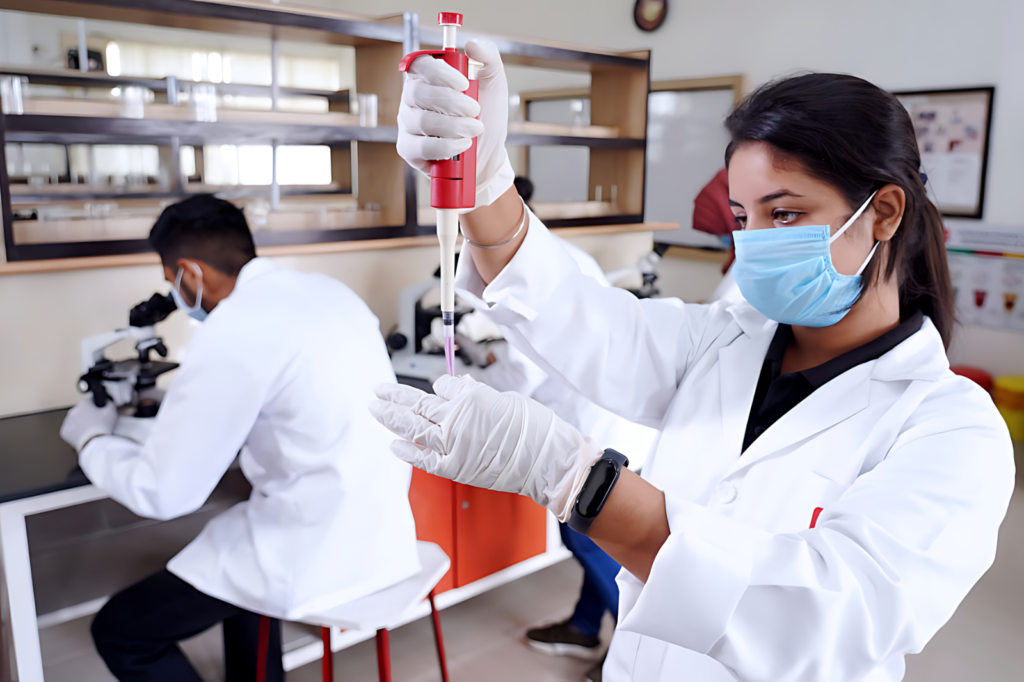
Nursing Science College in Sitapur
Overview
Welcome to the Nursing Science program at Renu Mahesh Sewa Sanstha. Our program is dedicated to training compassionate, skilled, and knowledgeable nurses ready to excel in various healthcare settings. Here’s a detailed overview of our program offerings.
Courses Offered
ANM (Auxiliary Nurse Midwifery)
- Duration: 2 Years
- Focus: Basic healthcare, midwifery, community health, and preventive healthcare.
GNM (General Nursing and Midwifery)
- Duration: 3.5 Years
- Focus: Comprehensive nursing care, midwifery, community health nursing, and mental health.
B.Sc. Nursing
- Duration: 4 Years
- Focus: Advanced nursing practices, healthcare management, and specialized nursing fields.
Course Structure
ANM (Auxiliary Nurse Midwifery)
Year 1
Community Health Nursing
- Basics of community health
- Preventive healthcare practices
- Maternal and child health
Health Promotion
- Nutrition and health education
- Environmental hygiene
- Immunization programs
Primary Healthcare Nursing
- Basic nursing procedures
- First aid and emergency care
- Infection control and management
Year 2
Midwifery
- Antenatal, natal, and postnatal care
- Conducting normal deliveries
- Newborn care and breastfeeding
Health Center Management
- Administration of health centers
- Record-keeping and reporting
- Community health programs
Internship
- Practical training in community health settings
- Hands-on experience in maternal and child health
GNM (General Nursing and Midwifery)
Year 1
Anatomy and Physiology
- Structure and function of the human body
- Major body systems
Fundamentals of Nursing
- Basic nursing skills and procedures
- Patient care and comfort
Community Health Nursing – I
- Introduction to community health
- Health education and promotion
Year 2
Medical-Surgical Nursing – I
- Care of patients with medical and surgical conditions
- Preoperative and postoperative care
Mental Health Nursing
- Basics of mental health and psychiatric nursing
- Therapeutic communication and counseling
Child Health Nursing
- Pediatric nursing care
- Growth and development of children
Year 3
Medical-Surgical Nursing – II
- Advanced medical-surgical nursing
- Specialized nursing care
Obstetric and Gynecological Nursing
- Maternal and newborn care
- Reproductive health
Community Health Nursing – II
- Advanced community health nursing
- Public health and epidemiology
Internship (6 months)
- Practical experience in various healthcare settings
- Application of theoretical knowledge in real-world scenarios


B.Sc. Nursing
Year 1
Anatomy and Physiology
- Detailed study of human anatomy and physiology
- Understanding of body systems
Nutrition and Biochemistry
- Principles of nutrition
- Biochemical processes in the body
Nursing Foundations
- Fundamental nursing skills and practices
- Introduction to patient care
Year 2
Pathology and Genetics
- Disease mechanisms and genetic disorders
- Diagnostic procedures
Medical-Surgical Nursing – I
- Care of patients with medical and surgical conditions
- Nursing management and interventions
Community Health Nursing – I
- Basics of community health and preventive care
- Health education strategies
Year 3
Medical-Surgical Nursing – II
- Advanced medical-surgical nursing
- Specialized patient care
Mental Health Nursing
- Psychiatric nursing practices
- Mental health assessment and intervention
Child Health Nursing
- Pediatric nursing and child development
- Nursing care for children with health conditions
Year 4
Obstetric and Gynecological Nursing
- Maternal and reproductive health
- Newborn care
Nursing Research and Statistics
- Research methodologies in nursing
- Data analysis and interpretation
Management of Nursing Services and Education
- Leadership and management in nursing
- Educational strategies for nursing students



Key Benefits
Comprehensive Education
- In-Depth Knowledge: Acquire extensive knowledge in nursing theory and practice.
- Specialized Training: Gain expertise in various nursing fields, including medical-surgical, pediatric, obstetric, and mental health nursing.
Practical Experience
- Clinical Practice: Engage in hands-on training in hospitals, community health centers, and clinics.
- Internships: Participate in internships to apply theoretical knowledge in real-world healthcare settings.
Professional Development
- Career Opportunities: Prepare for a successful career in hospitals, clinics, community health organizations, and educational institutions.
- Continuous Learning: Access ongoing professional development opportunities to enhance your skills and knowledge.
Admission Requirements
- Educational Qualification: Candidates must have completed their higher secondary education (10+2) with a focus on science subjects.
- Entrance Examination: Admission may require passing an entrance examination and an interview.
